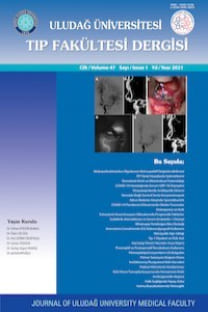Luteal Fazda Vajinal Laktobasil Desteğinin IVF/ICSI Sikluslarında Taze Embriyo Transferi Uygulanan Hastalarda İmplantasyon Oranlarına Etkisi
İnfertilite, Mikrobiyota, Laktobasil, Luteal Faz Desteği
Implantation Rates with Adding Vaginal Lactobacilli to Luteal Phase Support in Patients Undergoing Fresh Embryo Transfer in IVF/ICSI Cycles
Infertility, Microbiota, Lactobacillus, Luteal Phase Support,
___
- 1. Lander ES, Linton LM, Birren B, Nusbaum C, Zody MC, Baldwin J, et al. Initial sequencing and analysis of the human genome. Nature. 2001 Feb 15;409(6822):860–921.
- 2. Turnbaugh PJ, Ley RE, Hamady M, Fraser-liggett C, Knight R, Gordon JI. The human microbiome project: exploring the microbial part of ourselves in a changing world. Nature. 2007;449(7164):804–10.
- 3. Mendling W. Vaginal microbiota. In: Advances in Experimental Medicine and Biology. Springer New York LLC; 2016. p. 83–93.
- 4. Hurley E, Mullins D, Barrett MP, O’Shea CA, Kinirons M, Ryan CA, et al. The microbiota of the mother at birth and its influence on the emerging infant oral microbiota from birth to 1 year of age: a cohort study. J Oral Microbiol. 2019 Jan 1;11(1).
- 5. Kervinen K, Kalliala I, Glazer-Livson S, Virtanen S, Nieminen P, Salonen A. Vaginal microbiota in pregnancy: Role in induction of labor and seeding the neonate’’s microbiota? Vol. 44, Journal of biosciences. NLM (Medline); 2019.
- 6. Haahr T, Jensen JS, Thomsen L, Duus L, Rygaard K HP. Abnormal Vaginal Microbiota May Be Associated With Poor Reproductive Outcomes: A Prospective Study in IVF Patients - PubMed. Hum Reprod. 2016;795–803.
- 7. Ravel J, Gajer P, Abdo Z, Schneider GM, Koenig SSK, McCulle SL, et al. Vaginal microbiome of reproductive-age women. Proc Natl Acad Sci U S A. 2011 Mar 15;108(SUPPL. 1):4680–7.
- 8. Tachedjian G, Aldunate M, Bradshaw CS, Cone RA. The role of lactic acid production by probiotic Lactobacillus species in vaginal health. Res Microbiol. 2017 Nov 1;168(9–10):782–92.
- 9. R Koedooder, M Singer , S Schoenmakers , P H M Savelkoul, S A Morré, J D de Jonge, L Poort, W J S S Cuypers, N G M Beckers, F J M Broekmans, B J Cohlen, J E den Hartog, K Fleischer, C B Lambalk, J M J S Smeenk, A E Budding JSEL. The Vaginal Microbiome as a Predictor for Outcome of in Vitro Fertilization With or Without Intracytoplasmic Sperm Injection: A Prospective Study - PubMed. Hum Reprod. 2019. p. 1042–54.
- 10. Mangot-Bertrand J, Fenollar F, Bretelle F, Gamerre M, Raoult D, Courbiere B. Molecular diagnosis of bacterial vaginosis: Impact on IVF outcome. Eur J Clin Microbiol Infect Dis. 2013 Apr;32(4):535–41.
- 11. Brabant G. Bacterial vaginosis and spontaneous preterm birth. J Gynecol Obstet Biol la Reprod. 2016 Dec 1;45(10):1247–60.
- 12. Kyono K, Hashimoto T, Kikuchi S, Nagai Y, Sakuraba Y. A pilot study and case reports on endometrial microbiota and pregnancy outcome: An analysis using 16S rRNA gene sequencing among IVF patients, and trial therapeutic intervention for dysbiotic endometrium. Reprod Med Biol. 2019 Jan 1;18(1):72–82.
- 13. Hyman RW, Herndon CN, Jiang H, Palm C, Fukushima M, Bernstein D, et al. The dynamics of the vaginal microbiome during infertility therapy with in vitro fertilization-embryo transfer. J Assist Reprod Genet. 2012 Feb;29(2):105–15.
- 14. Miles SM, Hardy BL, Merrell DS. Investigation of the microbiota of the reproductive tract in women undergoing a total hysterectomy and bilateral salpingo-oopherectomy. Fertil Steril. 2017 Mar 1;107(3):813-820.e1.
- 15. Moreno I, Codoñer FM, Vilella F, Valbuena D, Martinez-Blanch JF, Jimenez-Almazán J, et al. Evidence that the endometrial microbiota has an effect on implantation success or failure. In: American Journal of Obstetrics and Gynecology. Mosby Inc.; 2016. p. 684–703.
- 16. Moore DE, Soules MR, Klein NA, Fujimoto VY, Agnew KJ, Eschenbach DA. Bacteria in the transfer catheter tip influence the live-birth rate after in vitro fertilization. Fertil Steril. 2000;74(6):1118–24.
- 17. Selim SA, El Alfy SM, Aziz MHA, Mohamed HM, Alasbahi AA. Effective of metronidazole to bacterial flora in vagina and the impact of microbes on live birth rate during intracytoplasmic sperm injection (ICSI). Arch Gynecol Obstet. 2011 Dec;284(6):1449–53.
- ISSN: 1300-414X
- Yayın Aralığı: 3
- Başlangıç: 1975
- Yayıncı: Seyhan Miğal
Birinci Düzey Travma Merkezinde Pediyatrik Servikal Travmaların Tedavisi
M Özgür TAŞKAPILIOĞLU, Pınar ESER OCAK, Oğuz ALTUNYUVA, Şeref DOĞAN
Zülfiye GÜL, Levent R. BÜYÜKUYSAL
Cihan UYSAL, Seher KIR, Nurol ARIK
Pediyatrik Kaudal Anestezi Uygulamalarının Değerlendirilmesi: Ulusal Anket Çalışması
Ümit Hüseyin TOPAL, Selcan YEREBAKAN AKESEN, Belgin YAVAŞCAOĞLU
Kiper ASLAN, Işıl KASAPOĞLU, Göktan KUSPİNAR, Berrin AVCI, Gürkan UNCU
Çetin SAYACA, Yener Emre SEVGİLİ
66 Yaşında Kadın Hastada Yeni Tanı ALCAPA Sendromu
Murat KERKÜTLÜOĞLU, Enes ÇELİK, Bayram ÖZTÜRK, Hakan GÜNEŞ
Yetmiş Beş Yaş ve Üstü Hastalarda Kemik İliği Değerlendirmesinin Klinik Yaklaşıma Katkısı Var mıdır?
Pelin AYTAN, Mahmut YERAL, Emrah KOÇER, Can BOĞA
Nörodejeneratif Hastalık Araştırmalarında Drosophila melanogaster Modeli
